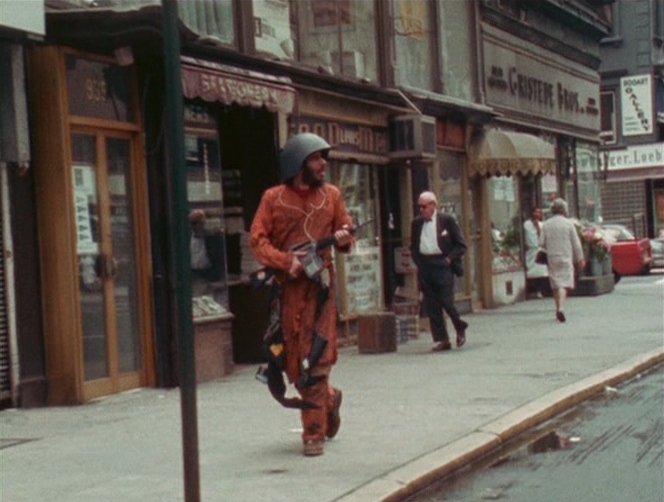For my first Tuesday screening at the Metrograph (January 18). Written for the first issue of the Trafic Almanach, in Jean-Luc Mengus' French translation, in January 2023. -- J.R.
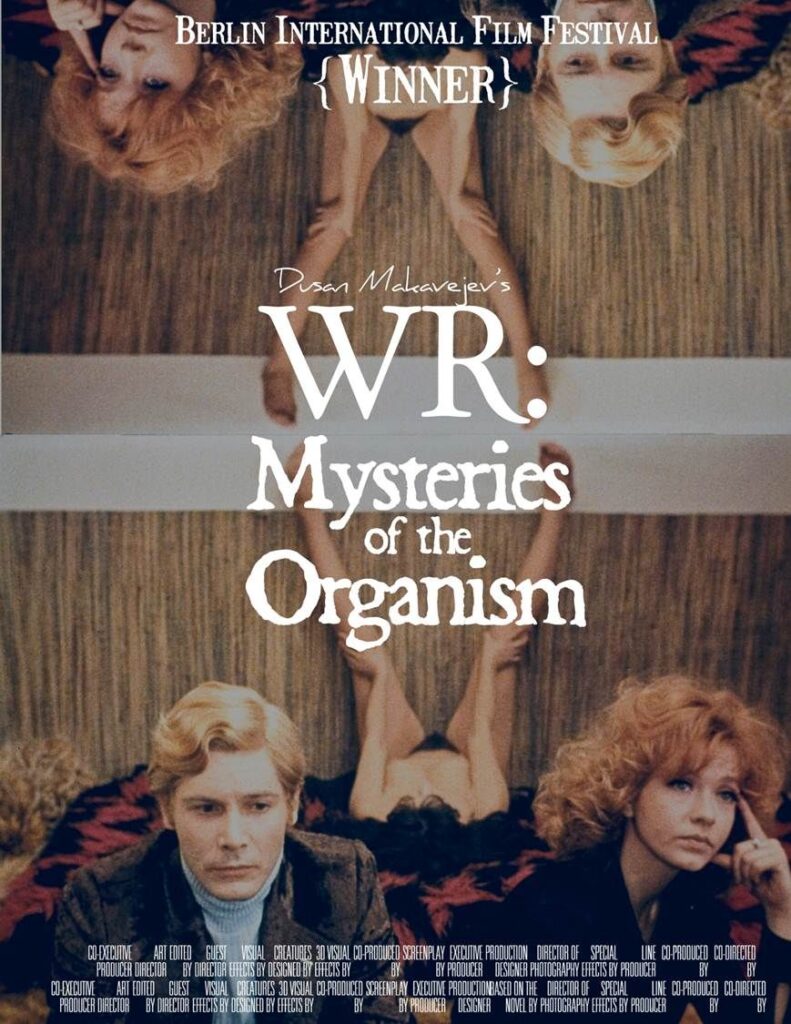
To burglarize Marx, we don’t make love
under circumstances we choose, we make
love under the circumstances we inherit,
and even pre-pandemic, the inherited
circumstances had been feeling pretty toxic
when it came to bodily matters….If love is a
matter of attractions and repulsions, of
bodies and how they collide, the afflictions
of the social body bleed into our individual
desires and disgusts too.
Laura Kipnis, Love in the Time of Contagion
The bracing shock delivered by Radu Jude’s entertaining Bad Luck Banging or Loony Porn (2021) reminds me of the shock carried by another entertaining Eastern European feature dealing with both sex and fear of sex, both contemporary culture and contemporary cultural restrictions, half a century earlier: Dušan Makavejev’s WR: Mysteries of the Organism (1971).
Of course, 1971 and 2021 are separated from each other by more than just fifty years and two notions of entertainment. The struggle to reconcile Freud with Marx that animated so much of the oeuvre of Bernardo Bertolucci, at least until its simplified resolution at the end of The Last Emperor (1987) in favor of Marx (”Is that so terrible?” Jin Yuan replies to Lu Yi in a prison yard. “To be useful?”) also clearly preoccupied Makavejev a quarter of a century earlier, when he arguably gave the edge to Freud, even while sadly acknowledging that Freudians, communists, socialists, and capitalists all proved to be equally scornful of Reich, at least in his later developments. But both Bertolucci and Makavejev were steeped in the obligatory either-or options of the Cold War, whereas Radu Jude, regarding Romania as a casualty of both Soviet Communism and Nazism, ruefully sees the choice his own country has faced in the form of two competing newspaper headlines, “Viva Stalin!” and “Viva Hitler!” If his post-Marxist melancholy bears some traces of Freudian pessimism, these seem to be the logical result of his conviction that acknowledging the shameful and repressed history of his country is both morally necessary and, in the current cultural climate, practically impossible. Thus sarcasm becomes his habitual reflex — like “political correctness”, both a veiled admission and a frustrated expression of political defeat.
More generally, Jude is living inside a wider but far less focused set of intellectual reference points — a cloud of philosophical and metaphysical chaos that produces the sensation of freefall in outer space, a descent or ascent into a void without gravity and therefore without a clear sense of direction: we’re all falling, meanwhile lacking any clear notion of where, how, or even if we might land. And because this is the condition we all share nowadays, his confusions become more instructive than the narrower uncertainties of Bertolucci and Makavejev because they’re more up to date. Living through both a pandemic with no foreseeable end and a global warming whose consequences are all too foreseeable, issues of sex and freedom begin to seem less urgent, hence more subject to sarcastic complaints.
The many sources of our disrupted attention spans are diagnosed in Johann Hari’s recent book Stolen Focus: Why You Can’t Pay Attention — and How to Think Deeply Again (New York: Crown, 2022) — the ways that surveillance capitalism weaponized by technology and its training of our reflexes to gratify our deepest (as well as our most momentary) desires tend to infantilize us, turning us into automatic spending machines (with money replacing tears) and passive consumers. These ways include “the increase in speed, switching, and filtering,” “the crippling of our flow states,” “the collapse of sustained reading,” “the disruption of mind-wandering,” and many other forms of interruption. This suggests the fragmented and dispersed attention spans that both WR and Bad Luck address with their diverse entertainments, though only the latter film attacks this problem with formal procedures more discursive and expansive than simple crosscutting.
The English titles of both films seem like awkwardly inexact translations of Serbo-Croat and Romanian. Surely mysteries of the orgasm, not “mysteries of the organism”, is what “WR” [Wilhelm Reich] evokes, and both “bad luck banging” and “loony porn” sound like unidiomatic approximations of Romanian slang. This is one way of suggesting that both films remain slightly beyond our reach, at least if we’re neither Serbian nor Romanian, even within their own historical periods. And indeed, what was once meant by “private” and “public” in 1971 can hardly be the same as what we mean after social media via mobiles, emails, and the Internet have overtaken and redefined them, sometimes to the point of making them sound almost anachronistic. (If PlayTime’s restaurant sequence were to be reshot today, its resurrection of public space would have to depend on deactivating mobiles, not architectural collapse.)
A redefinition of “public” and “private”– thanks to a mobile’s video recording of a married couple’s kinky sex “going viral” on the Internet — helped along by the pandemic’s diverse deprivations and uncertainties, is the subject of Jude’s film. Combine social media with the pandemic, factoring in multiple forms of fragmentation, regression, repression, and dislocation associated with both, and we arrive at a topic coinciding with our current cultural moment. And yet WR, with its own forms of fragmentation, regression, repression, and dislocation, seems just as contemporary. Unlike Jude’s film, it was shot on and intercuts between two continents, in two separate languages, in two film gauges (16-millimeter in New York, 35-millimeter in Belgrade). and in two political environments.
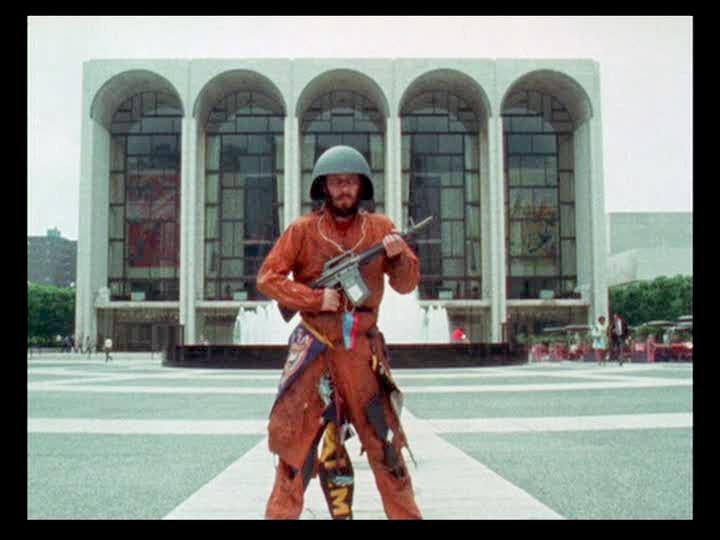
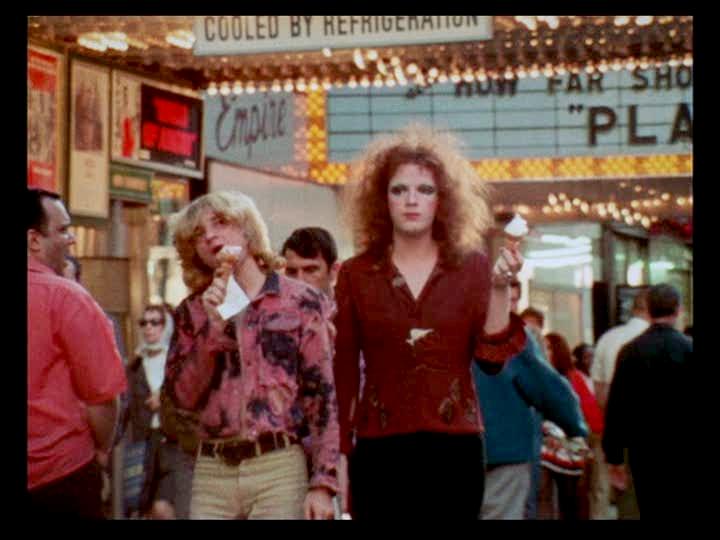
Yet the only repressions examined in detail and at length in WR are those of Wilhelm Reich’s work and his imprisonment in the U.S., and, more implicitly, the repression of Yugoslavia by Soviet Russia, whereas the problems and repressions examined in Bad Luck are far more universal, yet shown only locally. By contract, hippie Tuli Kupferberg can carry a machine gun, wear a battle helmet and army fatigues, and cavort in front of New York’s Lincoln Center without interference or even attracting much notice, and transsexual Jackie Curtis can pick up a man on the same Manhattan streets without anyone raising an eyebrow. In Bad Luck’s Bucharest, repressions of different kinds are visible in the face masks and in portions of what people say, but Jude remains stubbornly and exclusively within his own country, refusing to step outside apart from his use of literary quotations, which come from a wider geographical spread. (This is a film that, in Godardian fashion, lists twenty-five cited authors in its final credits, including such familiar international standbys as Benjamin, Brecht, Cioran, Malraux, and Woolf.)
Perhaps starting with Jackie Raynal’s Deux fois in 1968 and Godard’s 1 + 1 in 1969, a good many experimental films of Makavejev’s era –- among others, Hollis Frampton’s Zorns Lemma (1970) and (nostalgia) (1971), Pere Portabella’s Umbracle (1970), Edgardo Cozarinsky’s … (1971), and Mark Rappaport’s Casual Relations (1973) –- are based on principles of accumulation and/or list-making, of cataloguing separate items that fail to merge, a form of dialectics refusing or at least failing to arrive at any synthesis. WR: Mysteries of the Organism clearly belongs in this company, crosscutting between sexual ideas and practices, and between fiction and non-fiction, in both New York and Belgrade (even though the fictional characters in Belgrade carry the same names as the actors playing them). But so in some ways does Bad Luck, which in spite of its (unresolved) narrative devotes its second section to a “short dictionary of anecdotes, signs, and wonders” with items that flagrantly refuse to join one another except glancingly, mainly remaining detached from both the main story and from each other — a section that evokes in its bitter sarcasm both Ambrose Bierce’s The Devil’s Dictionary (1906), which it also quotes from, and Flaubert’s Le Dictionnaire des idées reçues (1911). But the freedom in crossing national borders evidenced by Deux fois (shot in Barcelona), 1+1 (shot in London), and WR (New York and Belgrade) isn’t shared by Bad Luck, in spite of the greater virtual access offered by the Internet. Perhaps this is related to the dictates of global surveillance capitalism: even if the big companies tend to do the same things everywhere, they still depend on a divide-and-conquer strategy through the isolation of national markets from one another. Viewing problems globally might lead to global boycotts ,whereas keeping things provincial makes the world more manageable from the standpoint of multicorporations.
A certain cinematic cliché about depicted sex infects both WR and Bad Luck — an association of vitality with speed and frenzied music that rejects tenderness entirely. Recall the sped-up motion and the William Tell Overture accompanying Alex (Malcolm McDowell) having sex with two teenyboppers in Kubrick’s A Clockwork Orange for the reductio ad absurdum/ad nauseum of this attitude — a form of Victorian hysteria masquerading as celebration. But Kubrick’s adolescent sense of humor is only a shade worse than the hyperventilation of the “loony porn” in Jude’s film and the manic intercourse of Jagoda (Jagoda Kaloper), the randy flatmate of Milena (Milena Dravic), in Makavejev’s film, which suggests that sex has to be gulped or guzzled like cheap wine in order to be appreciated rather than slowly sipped and savored. Admittedly, Jagoda’s compulsive screwing is intended as a comic rebuke to Milena, who habitually spouts Reichian principles to everyone within earshot without ever getting laid herself (although when she finally does, she gets beheaded by a Russian ice-skating star as a direct result). And the frantic sex of schoolteacher Emilia Colibiu (Katia Pascariu) with her husband, periodically interrupted by the offscreen demands of a babysitter, may not be accompanied by jaunty music, or music of any other kind, unlike the film’s final lurid fantasy sequence (Emilia as Wonder Woman performing a massive rape on all her accusers). Yet the association of kinkiness and/or sexiness with speed and force is no less pronounced. This also raises the vexing issue that one can’t always distinguish between Jude’s denunciation of Romanian vulgarity and his own apparent vulgarity in drawing our attention to it — an issue that hovers over all of this film’s depictions of sex (and much fewer of Makavejev’s). I’ll concede that both WR and Bad Luck see themselves as being at war with puritanism, which makes fast-motion and bouncy music weapons of cheerful defiance. Even so, it’s worth recalling that defiance is only one kind of pleasure, and not necessarily the most pleasurable kind.
For me, the most pleasurable, provocative, and innovative section of Bad Luck is neither its “loony porn” prologue (which strikes me as being neither loony nor porn, properly speaking, because it seems far too generic as a prosaic demonstration of what such private, kinky sex videos are expected to be like) nor the Godardian second section of quotes and clips but the preceding first section, the longest in the film, titled “One-Way Street” in homage to Walter Benjamin and devoted to Emilia’s walking across Bucharest as she goes on various errands, en route to a staff meeting at her prestigious school occasioned by the sex tape going online.
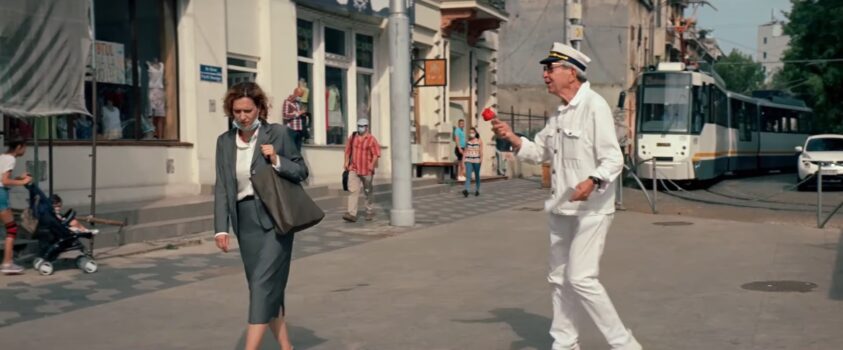
What’s remarkable about this sequence is the camera’s frequent independence from her trajectories as it moves horizontally or vertically away from her or her paths to explore other parts of the landscape, usually architectural or anecdotal — sometimes human, but most often not — often proceeding inquisitively or tentatively rather than declaratively, as if idly straying briefly from its assigned journey. In contrast to Emilia’s sex and her actual errands, which register at times like theorems about which Jude displays little curiosity, her long walks through Bucharest between those errands are pure adventures in exploration.
I’ve always been somewhat bored by Jeanne Moreau’s symbol-laden walk through Milan in Antonioni’s La notte (1961), which inspired Dwight Macdonald to remark that the Talkies had become the Walkies. In striking contrast to the more mysterious wanderings of Monica Vitti in L’avventura, L’eclisse, and Il deserto rosso, where the absence or uncertainties of meanings are far more provocative than the alleged significance of a broken clock and launched rockets in La notte, I find Katia Pascariu’s even more protracted walk through Bucharest neither boring nor pretentious, perhaps because Jude’s camera style is far more interrogative and exploratory, repeatedly panning away from her to her surroundings to discover how they might relate or else fail to relate to her. Antonioni clearly had a Statement in his mind about Moreau’s character and the modern world that he wanted to illustrate, whereas Jude is more open about what he doesn’t already know and needs to search for, acknowledging a wider world beyond his grasp.
The only (partial) precedent I know for this kind of narrative digression/distractiom is the style of cinematographer Masaki Tamura in such films as Shinsuke Ogawa’s 1973 documentary Narita: Heta Village and Nobuhiro Suwa’s first fiction feature, 2/Duo (1996), where the unpredictable drifts of the camera away from the ostensible narrative focus often redefine what that the subject of a particular shot might be. Tamura’s way of shooting an informal political discussion in Narita: Heta Village sometimes involves panning away from the person speaking — displaying an attentiveness to group interaction that finds responses to talk as important as the talk itself. And the placements and displacements of his camera in 2/Duo are often extraordinary in elucidating the essence of a scene. What initially might seem a perverse choice of camera angle turns out to be a highly original and compelling definition of where documentary and dramatic truth might be found — a definition that rethinks and resculpts conventional priorities regarding how a particular scene should be read, thereby encouraging us to reconceptualize its meaning.
What seems pertinent about this manner of de-centering a narrative path is that it suggests alternate paths for the viewer in engaging with Jude’s film as a whole: many possible paths and centers rather than a single linear itinerary — another version of the multiple viewing options offered in the restaurant sequence of Tati’s PlayTime, but applied over the separate sections of the film rather than within the multiple options of a single crowded shot. For once we start to ponder each section of the film, there are multiple options offered in each case: different kinds of sex offered in the prologue (first a whip, then a bed), different stray details in Emilia’s stroll through Bucharest, different quotes and anecdotes of varying relevance to Emilia’s story, different responses to the sex tape among her colleagues, and, finally, different outcomes to the debate. Life, in other words, assumes the shape of a multiple-choice question, the answer to which is left to us.
In his constant juggling between sexual options in New York and Belgrade, Makavejev projects a comparable kind of multiplicity (straight versus gay, intercourse versus masturbation, terror versus exaltation or ecstasy, talk or artmaking versus sex), although in his case an either/or pattern limits one’s choices: sex for Milena leads to Ivan’s madness and the loss of her head, even though her head continues to talk and she even concludes the film by smiling. Tuli Kupferberg’s “Kill for peace” song suggests a similar irrational dialectic.
One might conclude that Makavejev’s emotional view of 1971 is tragicomic and dialectical in other respects, whereas Jude’s emotional view of 2021 is less fixed and more dependent on the viewer’s biases: Here is our chaotic mess, he seems to be saying, and here are a few possible ways we might begin to cope with it. Hence drift and flow are his preferred modes, a series of searchlights that we’re invited to join or dismiss. Makavejev’s dialectical view ultimately springs from the possibilities as well as the limits of the Cold War; Jude’s multilateral view benefits as well as suffers from the confusions of the pandemic. Everyone to some degree is in the same mess, and no one knows exactly what this mess is.
Too nuanced and complex in his thinking to be a simple utopian, Makavejev perceives sex as an unleashing of potentially dangerous energies that threaten not only puritanical and authoritarian systems but also, in some limit cases, sanity (especially if we acknowledge that the latter term is commonly defined socially and legally more than it is psychologically or medically). So in WR, Milena’s eventual success in seducing Vladimir Ilyich ultimately leads to her getting beheaded by him with one of his ice skates — exposing certain dark mysteries of orgasms as well as organisms. To cite a suggestive formula proposed by the late Raymond Durgnat in his cogent 1999 book about the film in the BFI Modern Classics, Makavejev’s vision is that of a tragic Rabelaisian Marxist — an artist so dialectical in spirit that he can juxtapose his politically incorrect celebration of Nancy Godfrey in New York sculpting a plaster-cast replica of Screw editor Jim Buckley’s erect penis with a satirical song by Tuli Kupferberg about the destructive links between sex and capitalist ownership: “I’m gonna kill myself over your dead body if you fuck anybody but me.”
Makavejev was obviously risking not only censorship (and indeed, WR was banned in Yugoslavia for sixteen years, leading eventually to his exile), but also the danger of being misunderstood as some sort of ideologue. That is, in undertaking the same sort of juxtaposition of clashing ideological discourses proposed by Godard in La Chinoise (1967) and by Spike Lee in Do the Right Thing (1989), he risked being misread as a simplistic anti-Communist libertarian — much as Godard could be (and often was) misread as a Maoist, or Lee could be misread as a Malcolm X supporter dismissing the pacifism of Martin Luther King. In fact, Makavejev was attempting something far more difficult and valuable: a critical account of the possibilities and limits of two contradictory societies in relation to sex. Durgnat simplistically but accurately summarizes part of the result as, “The USA has more freedom than socialism, Yugoslavia has more socialism than freedom.” But one should stress that the comparison never takes the form of a simple contest in which there can only be one winner — the sort of sports analogy that Americans tend to favor, reducing all ideological issues to a battle between the home team and the enemy team. Even Jude in his landlocked sarcasm occasionally seems to echo this provincialism, at times discussing social problems that are shared around the globe as if they were specifically or even exclusively Romanian. (1)
- From an email sent by James Naremore on February 22, 2022: “…I wonder if you’ve placed too much emphasis on the ‘exclusively Romanian’ quality of the film. One of the things the tour of streets establishes is how much global capitalism has infiltrated everything — the Coca-Cola/Pepsi fast-food shops, the Xanax in the pharmacy, the plastic shopping bags, the plastic children’s toys, the graffiti, and even the shops in more expensive parts of town. Local or national culture is seen only in ruins or government architecture. The ‘trial’ scene provokes arguments that could be heard in any American school board meeting and even mentions Fox news. (Notice also the joke about the schoolteacher transforming herself and getting revenge by becoming a character in a Hollywood superhero movie.)”
Durgnat called WR “the first, and, along with Wajda’s Danton (1982) and Kusturica’s Underground (1995), the boldest exploration of social breakdown in Eastern European Communism.” Yet one can surely forgive Makavejev if his prescience in 1971 didn’t extend to the ways in which capitalist greed would ultimately overtake America’s grasp of entitlements, helped along by the eight years of the Ronald Reagan presidency (1981-89), during which ethics became reconfigured as a branch of public relations. During the war in Vietnam, it was unthinkable that any pundit could say that Lyndon Johnson or Richard Nixon was “bad for America [or the world] but good for television” the same way that many future pundits would remark about Donald Trump, if only because America, “the world,” and television weren’t considered such neatly separable entities in the 60s and 70s. Moreover, the very notion of using an expression like “good for television” as a euphemism for “good for making billionaires richer” might have been beyond Makavejev’s full grasp of the foreseeable future as reflected in language. How could anyone back then have predicted the fatalistic, tribal belief that algorhthms, not human beings, were somehow to blame for making hatred and hysterical panic more profitable for billionaires investing in
journalism and shaping “the news” than love, wisdom, or patience? Yet insofar as Makavejev and Jude have news of their own to impart, the degree of their own success has to be evaluated by different standards.
I recall a college classmate of mine in 1964 weeping at the end of Kubrick’s Dr. Strangelove, refusing to see the end of the world as a fit subject for laughter. People were really worried back then about nuclear bombs falling, whereas no one seems half as worried about this danger today, when the risk of it happening due to nuclear proliferation may well be greater, and when the prospect of polar icecaps melting may lead to consequences just as dire. Why is it that many of us can no longer remember our friends’ phone numbers, as we once did, because we supposedly have technology to “take care of” that for us? Whose “progress” is being mandated by this change? Are we better people now because our memories and attention spans have shrunk?
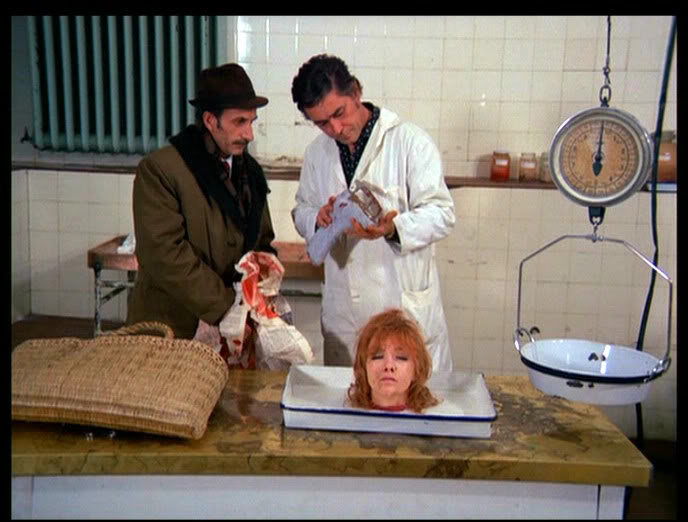
Makavejev and Jude clearly share a taste for anarchic exploration to counter the nefarious whims of our overlords. But the implicit hope implied by the severed head of a Reichian heroine continuing to talk to us and even to smile isn’t matched by the vision of a sexually free and intelligent schoolteacher raping her intolerant colleagues, even if that sour vision turns out to be good for both algorthms and box office while all of us glumly await the apocalypse. In fact, Emilia’s victory, defeat, and revenge are presented as options in Jude’s multiple choice question, which means that they share with her marital sex and her errands the status of theorems — postulates needed to construct Jude’s narrative, not actions meant to arouse our curiosity. It is only his detours in her journey across Bucharest and his collection of quotations and anecdotes, providing detours of another kind, that constitute his true adventures, his leaps into the void — and as Godard once argued, writing about Jacques Becker’s Montparnasse 19, “He who leaps into the void owes no explanations to those who watch.”



